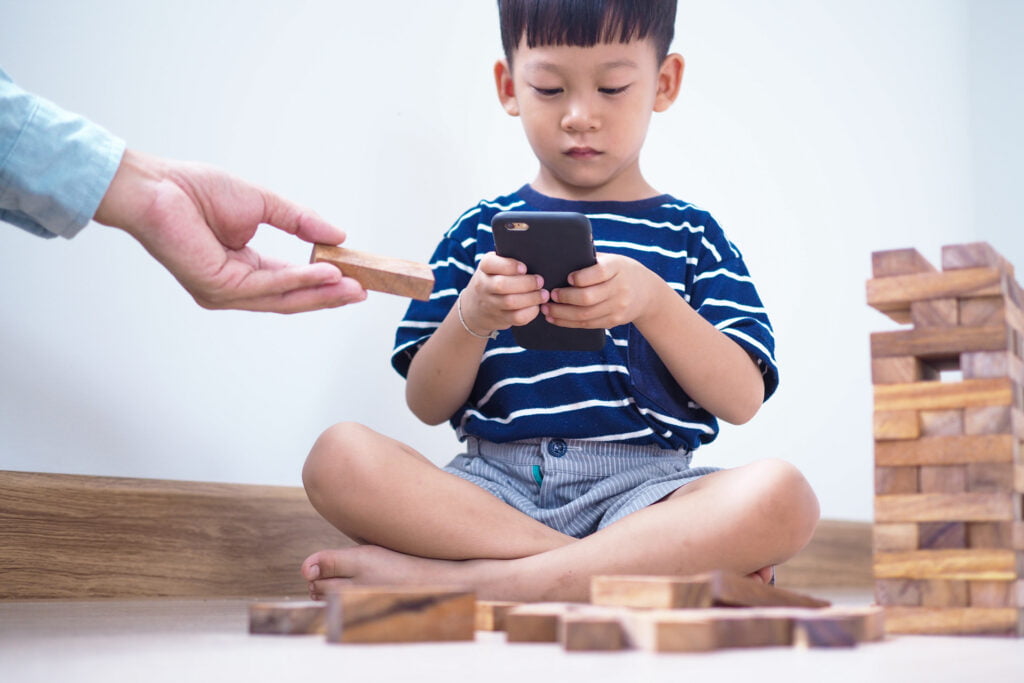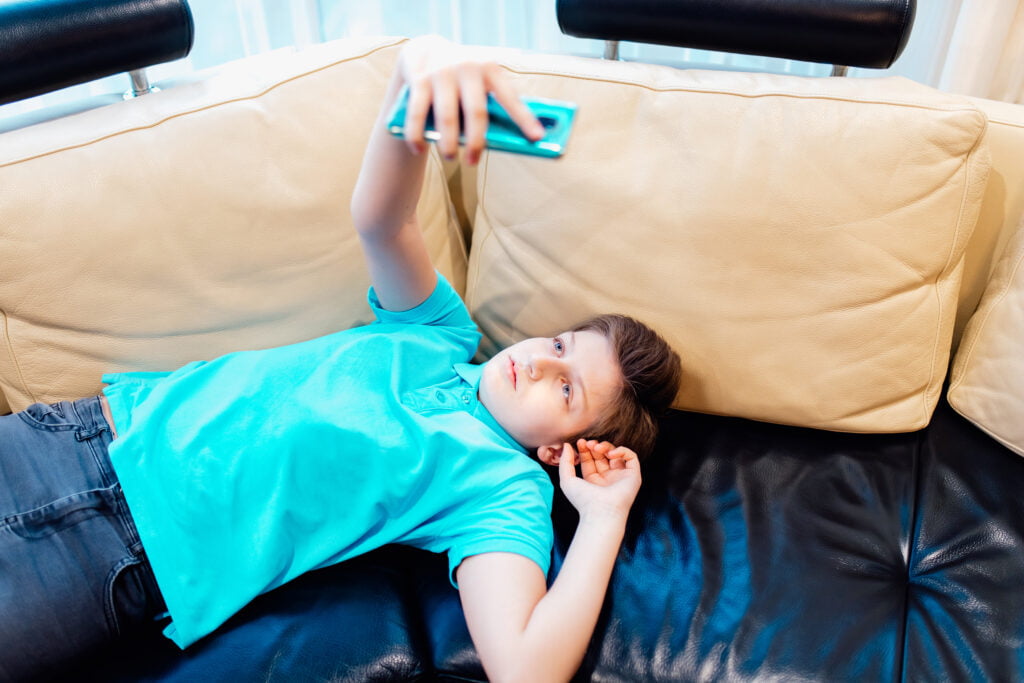Smartphones pervasive glowing screens casts a shadow across both young and old faces, becoming a part of the everyday life. Mobile phones are becoming less of a gadget, but more of an extension of the children’s lives, those born in the age of instant information and digital connections. It’s imperative to explore the impact of mobile phones on the cognitive development and learning abilities of children.

Despite the ease and connectedness these devices provide, the question always lurks in our minds: “Are smartphones making our children less intelligent than they should be?” The Answer to this question, like most things in life, is neither a simple Yes or nor a No. It’s a complicated scenario of possible advantages and disadvantages, created with the help of study, first hand knowledge, personal experiences and professional surveys.
So, in this article let’s explore the labyrinth of digital matrix, exploring its thrilling high points as well as its possibly dangerous low points.
Cognitive Concerns: Brain Plasticity & Effects of Screen Time
Children’s brains are remarkably plastic, i.e. the brain’s ability to change and reorganize neural networks based on their adapting and evolving experiences. An important cognitive worry is the effect of smartphones on people’s ability to focus for extended periods of time. It is more difficult to focus on a single activity for an extended period of time if we are constantly switching between tasks or if the information is presented at a rapid pace, according to research.


Imagine a classroom setting, where students aren’t paying attention, because instead of absorbing the teacher’s explanation, the student’s mind is flittering between a text message, a social media notification, and a quick online game on their smartphones.
Smartphones, are designed to be addictive. They trigger dopamine release in the brain when we receive notifications, likes, or other forms of instant gratification. This rewires our reward system, making us crave these quick hits of pleasure, potentially leading to decreased attention spans, impaired decision-making, and a diminished capacity for delayed gratification.
This digital juggling act works wonderfully for some kids, but it can be difficult for others who have trouble concentrating in a conventional classroom settings. Research suggests a correlation between excessive screen time and diminished cognitive abilities.
Memory Matters: Digital Reliance Creating mind inactivity
Do you recall committing figures and facts to memory for tests? The emergence of search engines and instantaneous access to information may be changing how kids assimilate information. The days of memorizing facts by heart are long gone, as every query can now be answered with a single tap.
This promotes reliance on outside sources, but it also develops critical thinking skills and the ability to make sense of the deluge of information. Finding a balance between utilizing technology as a tool for better learning and as a crutch for memory retention is crucial.
Social Shifts: Changing modes of human touch
The way people engage with each other is changing as a result of smartphones, especially for the younger generation. Online communications, which frequently lack non-verbal clues and emotional delicacy, eclipse face-to-face contact with all of its subtleties and complexities. This may result in misinterpretations, challenges in cultivating empathy, and even social anxiety during in-person interactions. But mobile & internet technologies also creates connections and span physical distances that would not have been conceivable without them. Online communities offer forums for people with similar interests, bridging gulfs and engaging friendships amongst people of different backgrounds and nationalities.


The Creative Enigma: Boon or Curse
Does the continual stimulation of digital screens reduce the capacity for creativity and imagination? Certain people contend that the well controlled realm of social media, with its focus on excellence and rapid satisfaction, inhibits autonomous reasoning and investigation. Some, meanwhile, regard technology as a blank canvas waiting to be filled with innovative ways to express themselves. Young kids brains are coming up with creative methods to use their devices to express themselves, from photography to illustrations, creative video filming, stop-motion animation to digital storytelling.


Beyond the Classroom: Mental Wellness and Health
Excessive screen usage has been associated in studies to elevated levels of anxiety, sadness, and sleep disruptions, especially in teenagers. Young brains suffer from the continual pressure to maintain a flawless online profile and FOMO, or the fear of missing out. Loss of eye sight, poor vision, fatigue and sleep deficiencies are some grave after effects of smartphones culture. Maintaining the mental health of our technologically aware young generation requires finding a balance between digital involvement and thoughtful self-care practices. Contrarily, technology may also be a very effective tool for supporting mental health which we will see in few examples later.
Getting Through the Maze: Digital Dilemma
So, are smartphones making our children dumb? Once more, the solution is not that easy. Although there are reasonable worries about possible disadvantages, concentrating just on the negative aspects presents an insufficient picture. The secret is to practice good digital citizenship and cultivate a positive rapport with technology. This entails establishing limits, promoting screen moderation, giving traditional education, and instigating free-frank interpersonal communication.
Its wise to adopt the opportunities smartphones offer while ensuring they don’t become a substitute for the richness of real-world experiences, human connection, and creative exploration. In doing so, we can help our children not only to navigate the digital maze but also emerge from it smarter, and ready to shine in the ever-evolving perspective of the 21st century.

Testimonials from Parents & Academicians
“I had long understood and accepted the notion that the growing problem of teen anxiety was primarily caused by phones. What’s unsettling about this, in my opinion, is that worry among teens isn’t the only thing that appears to be rising. Additionally, phones appear to be hindering students’ academic progress.”
“The smartphone bandwagon is one we ride together, children and adults alike. By accepting the potential pitfalls and proactively guiding young minds, we can ensure that technology becomes a tool for empowerment, not a path to diminished intellect.”
“It all started before aggravating more post COVID-19. You have already observed a decline in student test scores from 2012 to 2020. Everyone is aware of the events of 2020. Worldwide school closures were brought on by the pandemic, not only in the United States. According to PISA – Program for International Student Assessment, student achievement decreased in almost every nation between 2019 and 2022. Learning loss is genuine, PISA scores are also really declining over the long run.”


“There may be a campaign to forbid students from using their phones in class. Furthermore, I believe that this movement is just getting started. It seems like an experiment to me. I’m not sure if removing phones from kids’ desks in class will abruptly stop this trend.”
“Smartphone’s are the centuries worst inventions! And the reason for it is that, in addition to being a tool for mass comparison, they also make it easy for you to notice how fortunate and attractive everyone else is. They can also be used as a mass distraction weapon.”
“As a parent, I’ve seen how beneficial mobile phones are to both my kids’ education. The innovative apps and online tools and tutorials have improved their comprehension of difficult subjects. These useful instruments contribute in raising a tech-savvy and educated generation when used restrainedly and under responsible parental supervision.”
“A phone isn’t quite as fascinating as a Math’s calculus class, really. Calculus was something I took. Even though I wasn’t very good at it, I didn’t have this very intriguing toy to keep my attention away from the challenging calculus courses all the time.”
“Students that spend more time staring at their smartphones perform poorly academically, as evidenced by this. They frequently divert the attention of nearby students. They frequently have worsening life-related feelings. All of this has been discovered by PISA and other worldwide studies.”
Dive Deeper: Case Studies of smartphones muddle
Let’s examine a few real-world instances to better grasp the complex effects of smartphones. These examples demonstrate the personalized impact of smartphones and their capacity to both empower and challenge users.
The Story of Sarah: Consider Sarah, a bright, exuberant adolescent. She finds it difficult to concentrate in class, dividing her attention between the teacher’s lecture and her phone. Her eyes become clouded with frustration and her grades deteriorate. However, her entire world changes the moment she signs into her online coding club. With a swift touch of the keyboard, fingers create elaborate algorithms and solve challenging puzzles. A contagious smile lights up her face, revealing a level of concentration and cognitive ability that is rarely seen in the classroom. In addition to highlighting the possible drawbacks of divided attention, Sarah’s story shows how technology can stoke enthusiasm and bring forth unique qualities in people.

David’s Journey: David is a quiet, introvert child who fears physically interacting with people. The playground seems like a minefield, full with awkward noise and possible fears. However, David grows up at home, behind the screen. He becomes involved in online gaming communities, making friends with others who share his interests from all around the world. Amid the digital chitchats, he finds his voice, develops his cooperation abilities, and finds his wit. David’s experience demonstrates how technology may help close social gaps by offering secure venues for connection and boosting self-esteem in people who find it difficult to interact with others in person.

Mia’s Shrinking World: Mia, a bright and inquisitive 13-year-old, was once a ray of sunshine in her classroom. Recently, a shadow fell over Mia’s world. The culprit? Her new smartphone, a gift on her 12th birthday.
Initially, the phone was a portal to wonder, but soon it faded, replaced by an insatiable hunger for instant satisfaction. Games with addictive rewards sucked her in, demanding minutes that stretched into hours, and social media became an obsession. The consequences were stark. Mia’s grades dipped, her once-engaging classroom participation dwindled to distracted fidgeting. Sleep, essential for a growing child, became fragmented by late-night glow of the screen.
Mia’s parents realized the phone had become a double-edged sword. They tried to implement boundaries and restrict usage. But it became a difficult domestic battle, met with tears and resistance, fueled Mia’s FOMO, low self-esteem and depression.
Mia’s story is a cautionary tale and a testament to the potential negative side effects of unchecked smartphone use. It highlights the importance of open communication, establishing boundaries, and prioritizing real-world experiences for children.

Beyond Binary Labels: These are just glimpses into the complex world of smartphones influences. Each child steers the mobile maze differently, their experiences shaped by personality, environment, and access to resources. Instead of labeling them as “dumbed down” or “tech-savvy,” we must recognize the nuanced spectrum of individual responses.
Beyond the Screen: Unplugging and Reconnecting
Establishing roads for offline experiences is extremely vital in the puzzling digital engagement age. Promoting outdoor activities, cultivating in-person dialogues, and placing family time apart from electronic devices at the forefront of the schedule are critical components in encouraging sound development. Remember, the real world, with its messy beauty and genuine humane connections, presents prospects for development and knowledge acquisition that virtual screens and digital devices can never replicate. So, its of utmost importance to stay digitally unconnected at times as well.
Determining the Nature of Learning in the Digital Age
Smartphones disrupt conventional educational models, without a doubt. However, rather than perceiving them as adversaries, we ought to welcome them as possible drivers of transformation. Educators who are technologically savvy are already utilizing it to organize instruction in a personalized manner, facilitate interactive learning experiences, and accommodate various learning styles. Augmented reality, gamification, and e-learning platforms provide interactive ways to supplement conventional classroom methods, thereby making learning more dynamic and accessible.

Parental Guidance: Cultivating Responsible Digital Citizenship
The task of navigating wisely through the labyrinth of digital age is not exclusively the children’s responsibility. Both parents and educators have a significant impact on the development of responsible digital citizenship in children. Establishing technology-free zones, encouraging open communications, and establishing clear boundaries are all crucial measures. In addition, parents have the ability to serve as role models by practicing sound technological practices. By exemplifying conscientious screen usage, emphasizing authentic social engagements, and encouraging imaginative investigation outside the realm of digital platforms, we can establish a foundation for forthcoming brigades to flourish in a technologically saturated society.

For children in the twenty-first century, the smartphones maze offers both opportunities and obstacles. We can either assist kids in overcoming this challenging environment by embracing the positive aspects, or be ignorant and let their future slip-away. Recall that smartphones are instruments, not the solution.
As the adults in their lives, it is our responsibility to provide them the knowledge and understanding to use these tools sensibly so that they come out of the maze not just smarter but also more resilient, adaptive, and all-around people.
Read this article on interesting effects of Artificial Intelligence









